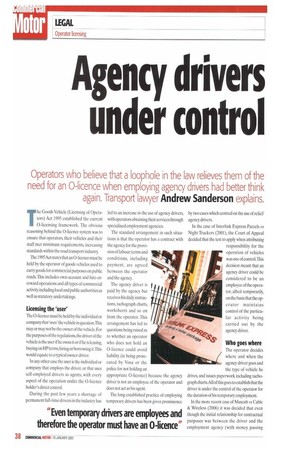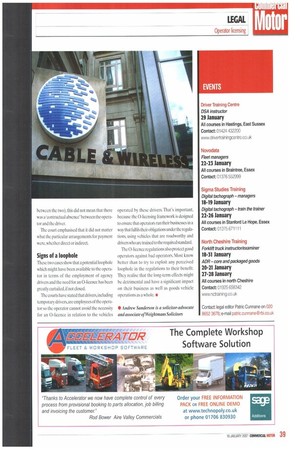Agency drivers under control
Page 38

Page 39

If you've noticed an error in this article please click here to report it so we can fix it.
Operators who believe that a loophole in the law relieves them of the
need for an 0-licence when employing agency drivers had better think again. Transport lawyer Andrew Sanderson explains.
The Goods Vehicle (Licensing of Operators) Act 1995 established the current 0-licensing framework. The obvious reasoning behind the 0-licence system was to ensure that operators, their vehicles and their staff met minimum requirements, increasing standards within the road transport industry.
The 1995 Act states that an 0-licence must be held by the operator of goods vehicles used to carry goods for commercial purposes on public roads, This includes own-account and hire-orreward operations and all types of commercial activity including local and public authorities as well as statutory undertakings.
Licensing the 'user'
The 0-licence must be held by the individual or company that 'uses' the vehicle in question.This may or may not be the owner of the vehicle. For the purposes of the regulations, the driver of the vehicle is the user if he owns it or if he is leasing, buying on HP terms, hiring or borrowing it.This would equate to a typical owner-driver.
In any other case the user is the individual or company that employs the driver, or that uses self-employed drivers as agents, with every aspect of the operation under the 0-licence holder's direct control.
During the past few years a shortage of permanent full-time drivers in the industry has led to an increase in the use of agency drivers, with operators obtaining their services through specialised employment agencies.
The standard arrangement in such situations is that the operator has a contract with the agency for the provision of labour; terms and conditions, including payment, are agreed between the operator and the agency.
The agency driver is paid by the agency but receives his daily instructions, tachograph charts, worksheets and so on from the operator. This arrangement has led to questions being raised as to whether an operator who does not hold an 0-licence could avoid liability (ie being prosecuted by Vosa or the police for not holding an appropriate 0-licence) because the agency driver is not an employee of the operator and does not act as his agent.
The long-established practice of employing temporary drivers has been given prominence by two cases which centred on the use of relief/ agency drivers.
In the case of Interlink Express Parcels vs Night Truckers (2001), the Court of Appeal decided that the test to apply when attributing responsibility for the operation of vehicles was one of control.This decision meant that an agency driver could be considered to be an employee of the operator, albeit temporarily, on the basis that the operator maintains control of the particular activity being carried out by the agency driver.
Who goes where
The operator decides where and when the agency driver goes and the type of vehicle he drives, and issues paperwork including tachograph charts.All of this goes to establish that the driver is under the control of the operator for the duration of his temporary employment.
In the more recent case of Muscatt vs Cable & Wireless (2006) it was decided that even though the initial relationship for contractual purposes was between the driver and the employment agency (with money passing between the two), this did not mean that there was a 'contractual absence' between the operator and the driver.
The court emphasised that it did not matter what the particular arrangements for payment were, whether direct or indirect.
Signs of a loophole These two cases show that a potential loophole which might have been available to the operator in terms of the employment of agency drivers and the need for an 0-licence has been greatly curtailed, if not closed.
The courts have stated that drivers, including temporary drivers, are employees of the operator so the operator cannot avoid the necessity for an 0-licence in relation to the vehicles operated by these drivers. That's important. because the 0-licensing framework is designed to ensure that operators run their businesses in a way that full ils their obligations under the regulations, using vehicles that are roadworthy and drivers who are trained to the required standard.
The 0-licence regulations also protect good operators against bad operators. Most know better than to try to exploit any perceived loophole in the regulations to their benefit. They realise that the long-term effects might be detrimental and have a significant impact on their business as well as goods vehicle operations as a whole. • • Andrew Sanderson is a solicitor-advocate and associate of Weightmans Solicitors






















































































































































































